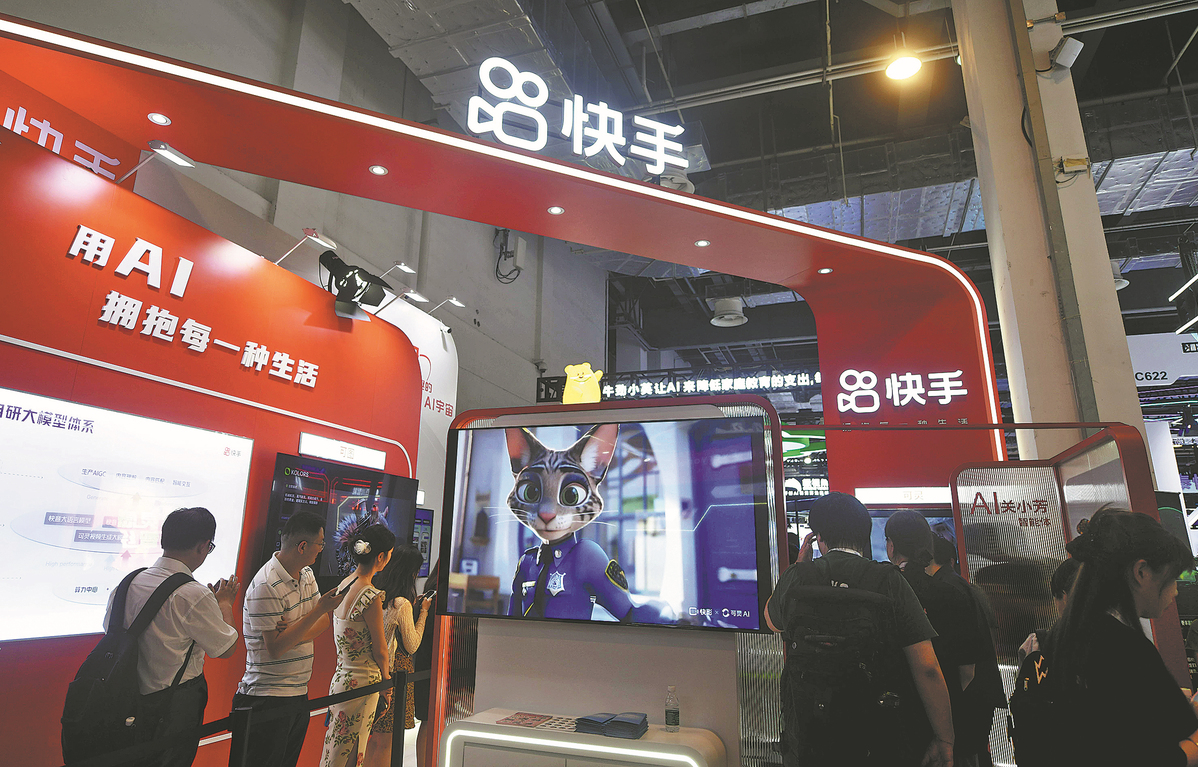Video generation AI creating new niche
Kuaishou's Kling generates 200 million videos for enterprises, users worldwide


Chinese video-sharing platform Kuaishou Technology is banking on artificial intelligence-powered video generation models, which boast immense application potential in fields including film, animation, mini dramas and advertising.
Experts believe text-to-video generators have the potential to revolutionize the short-video, advertising and movie trailer industries after US-based AI research company OpenAI's Sora took the world by storm.
Since its launch in June last year, Kuaishou's video generation model Kling has undergone more than 30 iterations and upgrades, with the number of global creators reaching more than 45 million, while generating over 200 million videos and 400 million images, and serving more than 20,000 enterprise customers.
Gai Kun, senior vice-president of Kuaishou and head of Kling AI, said 2025 is bound to be a crucial year for bolstering the in-depth application of generative AI technology, highlighting that video generation models are witnessing rapid development and application.
Gai said AI has great growth potential in video and image generation, and the goal of Kling AI is to become the new infrastructure for video creation in the era of AI, enabling "everyone to tell good stories with AI".
The model has been leveraged in various sectors, such as marketing and advertising, film, television, animation and game production, he added. Looking forward, Kling AI will continue to focus on technological innovation and accelerate its deep application across a wide range of scenarios.
Kuaishou rolled out its Kling AI 2.0 video generation model in April. The AI model outperformed peers such as OpenAI's Sora in some dimensions, including semantic responsiveness and visual and motion quality, marking a significant breakthrough in AI video creation, the company said.
The model can interpret prompts to generate high-quality videos that mimic the physical world and create imaginative scenes from text instructions. Multimodal editing capabilities are also available on the Kling AI platform, where users can input their ideas through images and other formats, generating creative videos that align with their concepts.
Xue Xiaolu, one of China's most commercially successful female directors, said AI has reshaped the traditional film and television production process, as from scriptwriting to storyboarding, video generation and editing, all of the tasks could be completed quickly with the help of AI, significantly reducing production time and cost.
Ma Shicong, an analyst with Beijing-based internet consultancy Analysys, said Kuaishou has accumulated ample experience and technical strengths in AI, video, livestreaming and algorithms over the past few years.
Ma said the company hopes to seek new sources of revenue and speed up its monetization efforts by expanding its footprint in the fast-developing AI-generated content segment amid fierce competition from local rivals.
The training of video generation AI models necessitates higher requirements for computing capacity, algorithms and high-quality data, said Pan Helin, a member of the Expert Committee for Information and Communication Economy, which operates under the Ministry of Industry and Information Technology.
Chinese tech companies should beef up self-developed and proprietary abilities in underlying computing power chips and programming software, as well as increase investments in basic scientific research, to catch up with foreign counterparts in the AI chatbot race, he said.
Noting that AI-generated content or AIGC-related technologies will improve the productivity of content production and inject fresh impetus into China's economic growth, Pan said more efforts are needed to bolster the efficient circulation of data elements, and expand application scenarios of video generation models in a wider range of segments.
Chen Duan, director of the Digital Economy Integration Innovation Development Center at the Central University of Finance and Economics, said AIGC technology will lead to a new revolution in the field of digital content production, and bolster innovation in the digital culture industry.
Chinese enterprises have unique advantages in expanding AI application scenarios compared with their foreign peers, based on China's enormous domestic social media networks and the world's largest number of active internet users, she said, adding that text-to-video generators have the potential to revolutionize sectors including short videos, advertising and movie trailers.
fanfeifei@chinadaily.com.cn




































